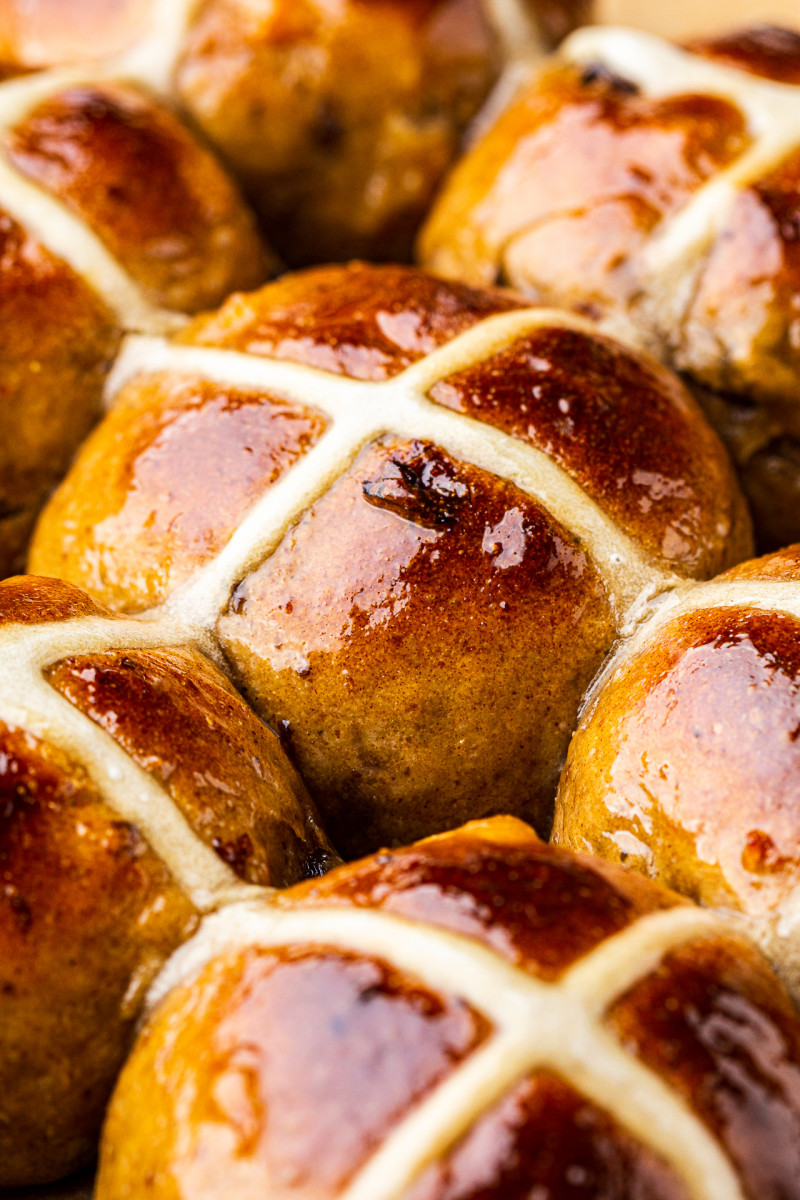
Today’s recipe – for sugar-free hot cross buns – is inspired by the fact that it’s almost Easter and I have stupidly decided to ditch sugar this January and I am still holding on by the skin of my teeth!
Jokes aside, I do feel great without eating sugar (I can now safely say I was addicted to it) but any kind of celebratory time of the year, like Easter, is certainly a bit more challenging. Every shop I step into features a prominent display of glossy hot cross buns so it’s hard not to want some too – this is what made me attempt to make sugar-free hot cross buns and I am pleased to say that they delivered.
These sugar-free hot cross buns do not feature any added sugar apart from the glaze, which is totally optional. I glazed my sugar-free hot cross buns for the photos as photographing buns without the shine is a bit sad plus I am not that strict myself.
My aim was to stop eating cakes, sweet buns, desserts that my kitchen was always inundated with and chocolate, which I always have in my cupboards because of what I do for a living. I continue to use a teaspoon of some kind of sugar in my tomato sauce or in my stir-fry sauce for balance of flavour and I find that these tiny amounts do not escalate my cravings at all.
The only kind of sugar I have on a more regular basis is dates and date bars as they contain both the sweetness and the accompanying fibre, which means that the body processes it differently. It is still sugar so I don’t overindulge but I am also realistic – this small indulgence helps me to stay compliant in the long run. So you have probably guessed it by now, these buns are sweetened with dates instead of sugar. To achieve that, I simply blended pitted dates with all the liquids this recipe needs and added this sweet sticky mixture to the dry ingredients. Dates add just a right amount of sweetness for me, not too much, which is what hot cross buns are supposed to be anyway – only just subtly sweet.
I made these sugar-free hot cross buns in a standing mixer as hot cross bun dough is quite sticky and therefore messy to work with. You can knead them by hand too, but it’s quite messy so be prepared. If you do, granite or marble countertop is better than wooden one when it comes minimising sticking and keeping the dough cool, damp hands also help and be prepared for a bit of a workout but then you will have soft and fluffy buns at the end of it so it’s worth it.
MORE ABOUT THE INGREDIENTS
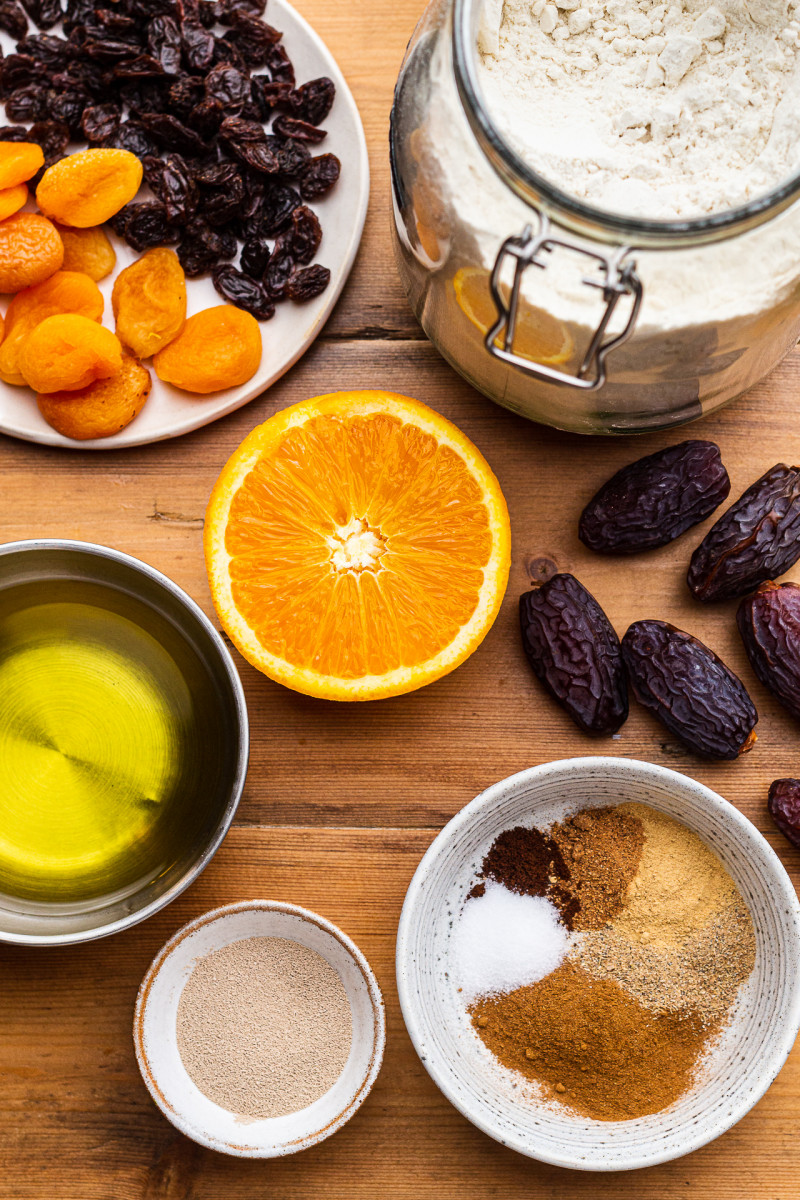
DATES: Dates, blended with liquid ingredients, is what provides a hint of sweetness to the dough. You can use any types of dried dates you like and there is no need to soak them unless they are really dry. If you do soak them, hold some of the liquid back as you don’t want to add too much.
ORANGES: I used orange zest in the dough and juice to hydrate my raisins first and then to hydrate the dough. You can use one orange if you want a very subtle orange flavour or two oranges if you want it come through more. You can also use lemon zest (not juice) or one orange and one lemon for an all round citrus aroma.
SPICES: Hot cross buns are spiced buns, some people prefer subtle spice, I like it a little more pronounced. In terms of types of spices, there are as manu ways of flavouring these buns as there are bakers. Many people use allspice (also known as Jamaican pepper) and cinnamon. Some used mixed spice (mixture of spices including cinnamon, allspice, nutmeg, cloves, ginger, coriander and mace). I used a combination of spices I enjoy: cinnamon, ginger, nutmeg, cardamom and just a bit of cloves.
SALT: A small amount of salt is needed for flavour even if the dough is meant to be sweet. I went for half a teaspoon, but some recipes use as much as a teaspoon. Feel free to override me.
FLOUR: Typically hot cross buns are made with high protein flour known as bread flour or strong flour in some countries. There are a lot of ingredients in this dough that inhibit rising: dried fruit, cinnamon, dates so bread flour is best but I’ve also made these with 50% bread and 50% all purpose flour and they came out soft and fluffy. I would not recommend using 100% all purpose flour though.
YEAST: Hot cross buns are yeasted buns, typically you’ll use 7 g (one sachet) of yeast for this amount of flour, but I upped the amount as my dough contains twice the amount of dried fruit (dates), which are known to inhibit rising. I used instant dried yeast (not to be confused with active dry yeast, which needs activation), which is added directly to the dry ingredients and does not need prior activation in liquid.
DRIED FRUIT: Hot cross buns derive a lot of their flavour from liberal amount of dried fruit that is added to the dough. You can use anything you like provided it’s small or chopped small. Typically, you’ll find traditional recipes using raisins, sultanas or currents, dried apricots, candied orange and lemon peel, I also liked to use stem ginger (in my non sugar-free hot cross bun recipe), but for these I used raisins and apricots as they don’t typically have any added sugar (like cranberries).
OIL: Hot cross bun dough is an enriched dough, which typically features butter. You can use melted vegan butter if you wish (I like Naturli and Violife best), but I opted for mild olive oil. The only thing I do not recommend is coconut oil as it tends to solidify in lower temperatures so if you were to proof these overnight in the fridge, they will come out rock hard.
GLAZE: The only way to make these buns shiny once they come out of the oven is to apply some kind of sugar glaze. I used the syrup that stem ginger is preserved in, but you can use maple syrup, strained apricot jam or golden syrup too. If you want them to be completely sugar-free, simply do not glaze them or glaze them with soy/oat milk before baking – they will not be as shiny though.
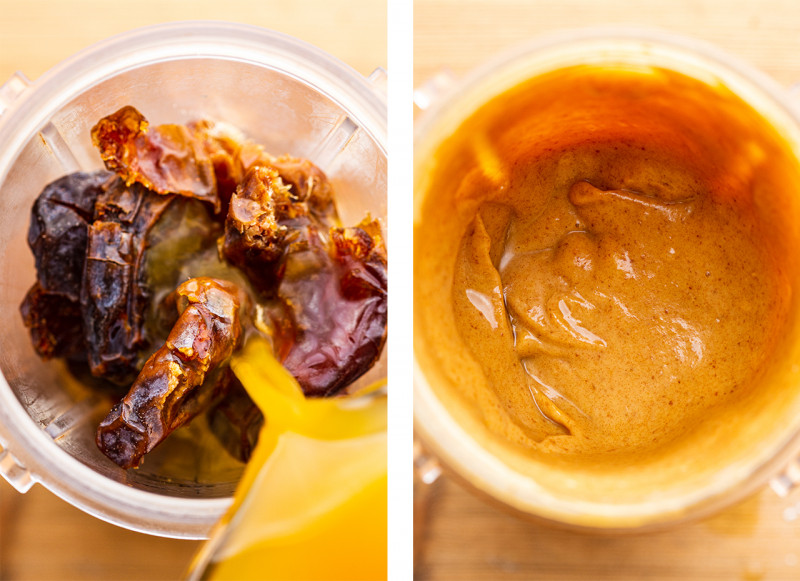
To make the date paste, blend pitted dates with orange juice (and water if you don’t have enough), vanilla and olive oil. Use a spatula to make sure all of the dates are blended well.
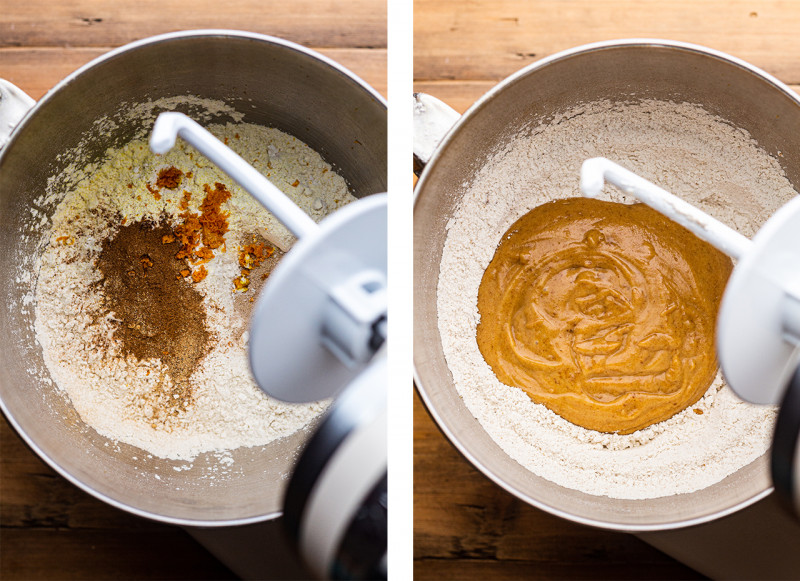
Combine all of the drying ingredients in a mixing bowl, mix them together on the lowest speed, then add all of the date paste, be sure to get everything out.
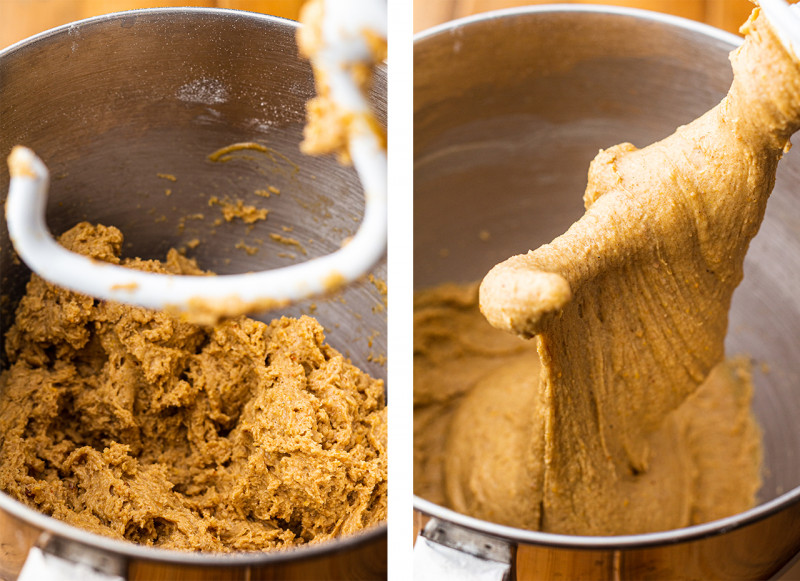
Blend on low speed until everything comes together, if the mixture is too dry, add a bit more water – little at a time. Knead on low speed until the dough is elastic and smooth and comes away from the sides of the bowl.
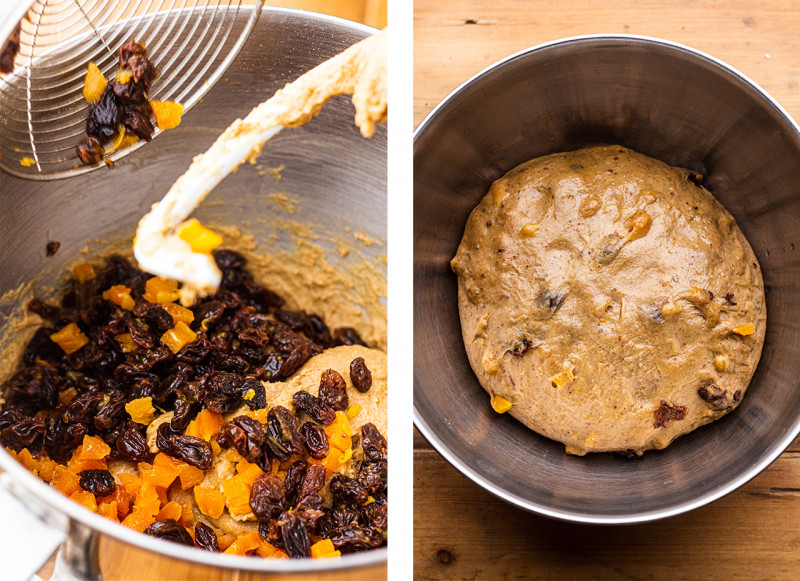
Add dried fruit and mix lightly, just to incorporate them. Shape the dough into a bowl and place in a clean, lightly oiled, bowl for proofing. Cover with cling film and proof it in a warm place for 2-3 hours or overnight in the fridge.
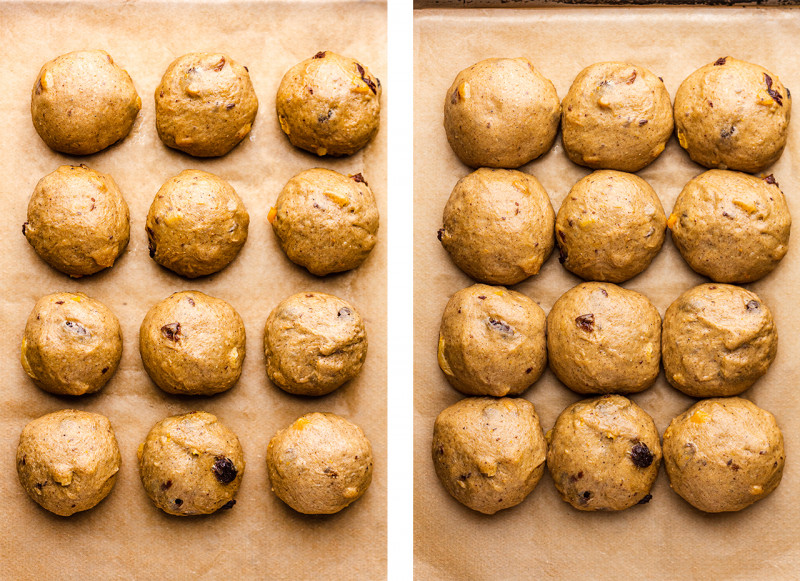
Once the dough has proofed, divide it into 12 even portions, shape each portion into a ball and arrange them on a baking tray in a 3 by 4 grid. Keep allow some space between the buns to give them room to expand.
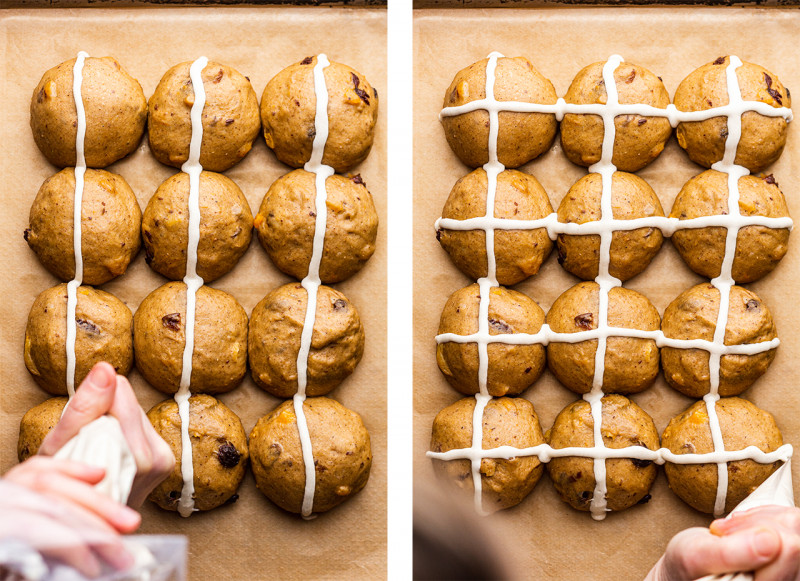
Once the buns have proofed and are ready to bake, pipe flour paste on top in continuous lines to form a cross on top of each bun. Bake until golden.
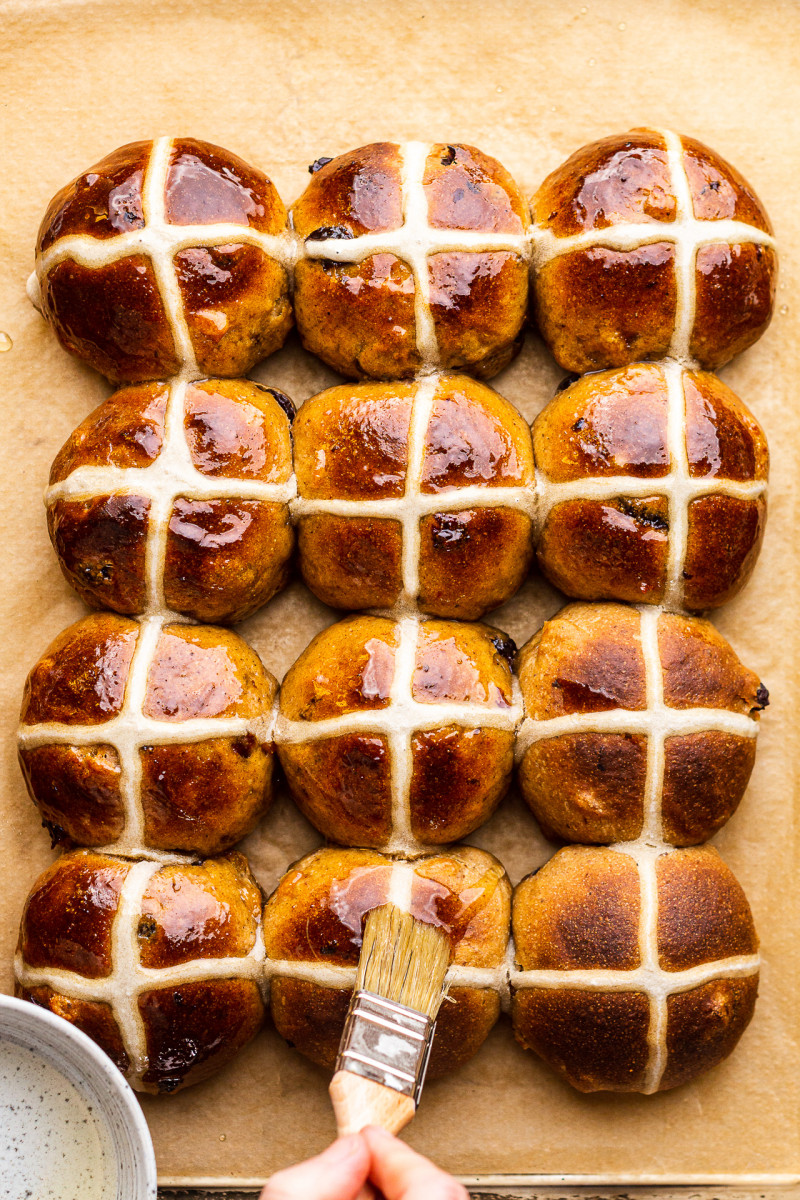
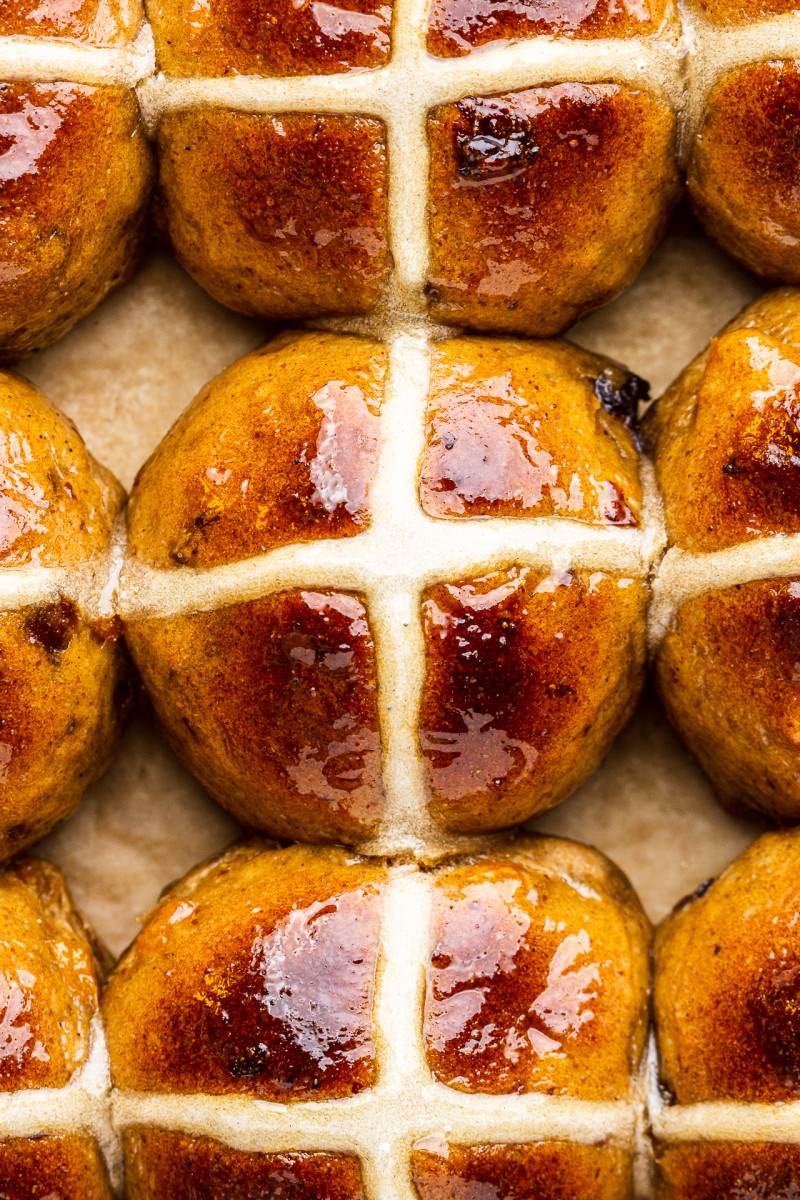
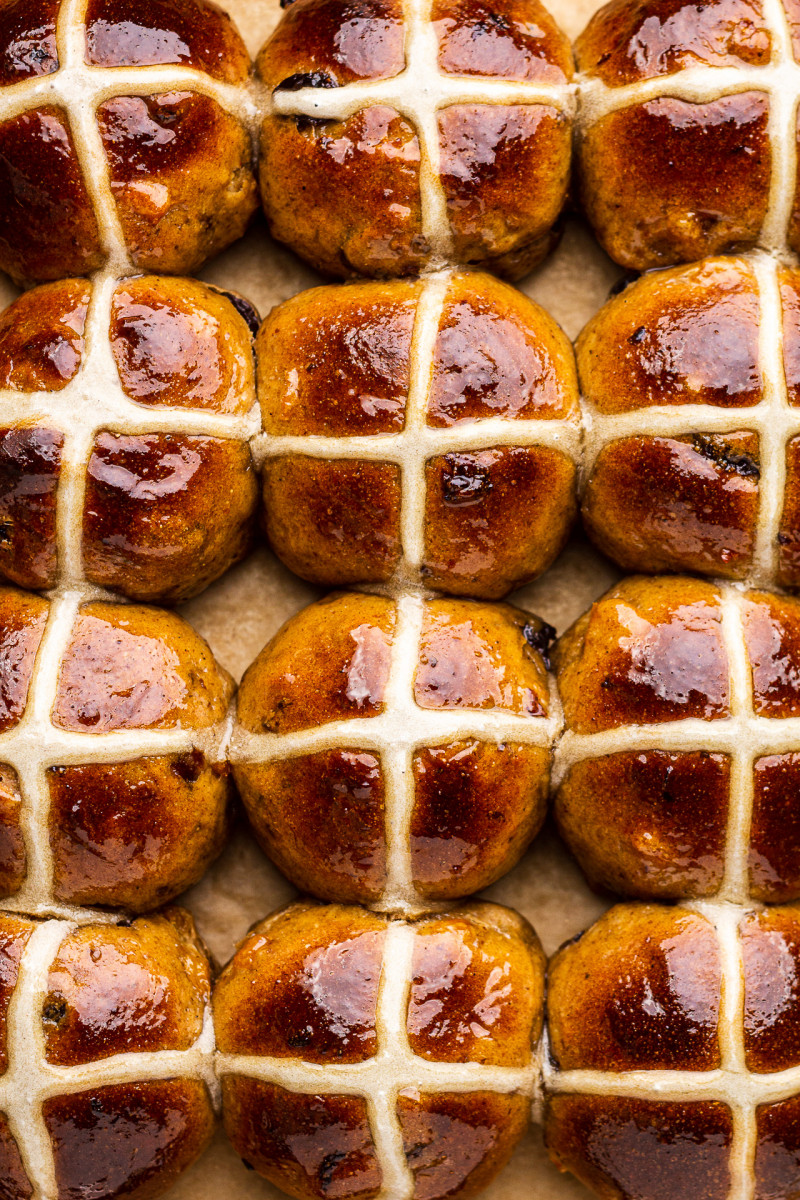
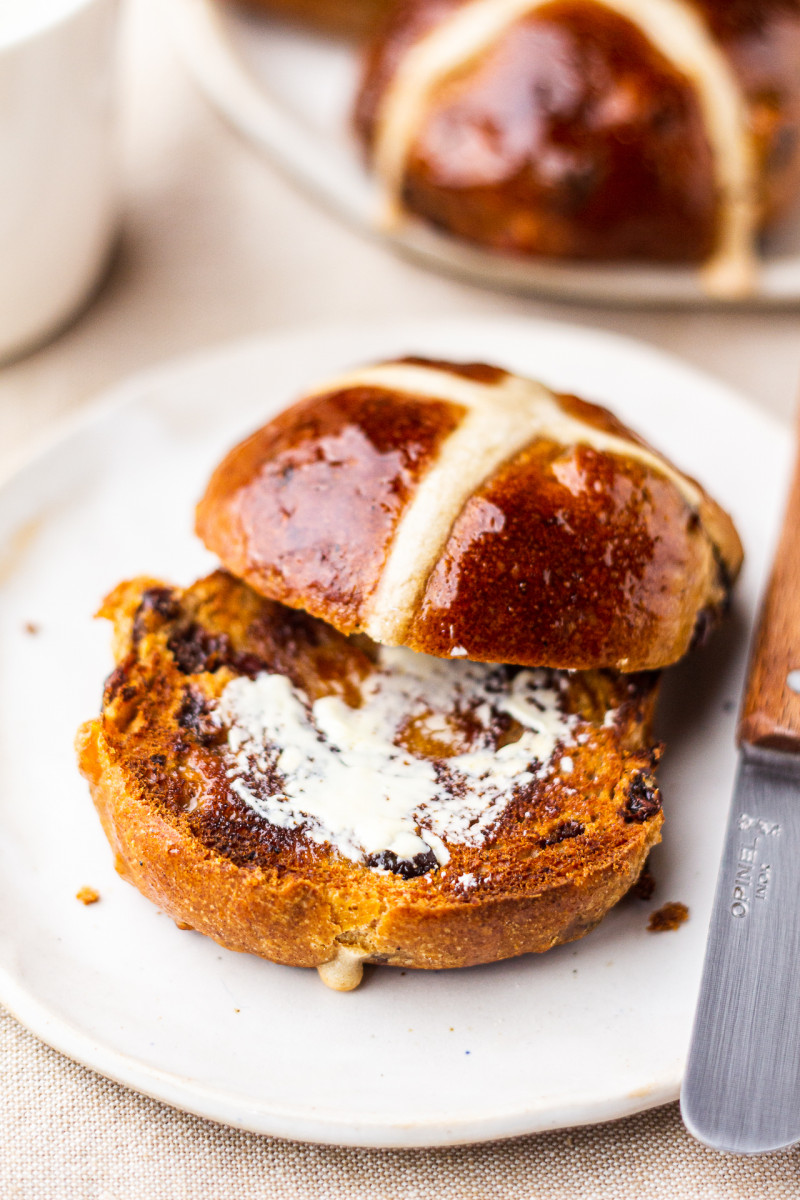
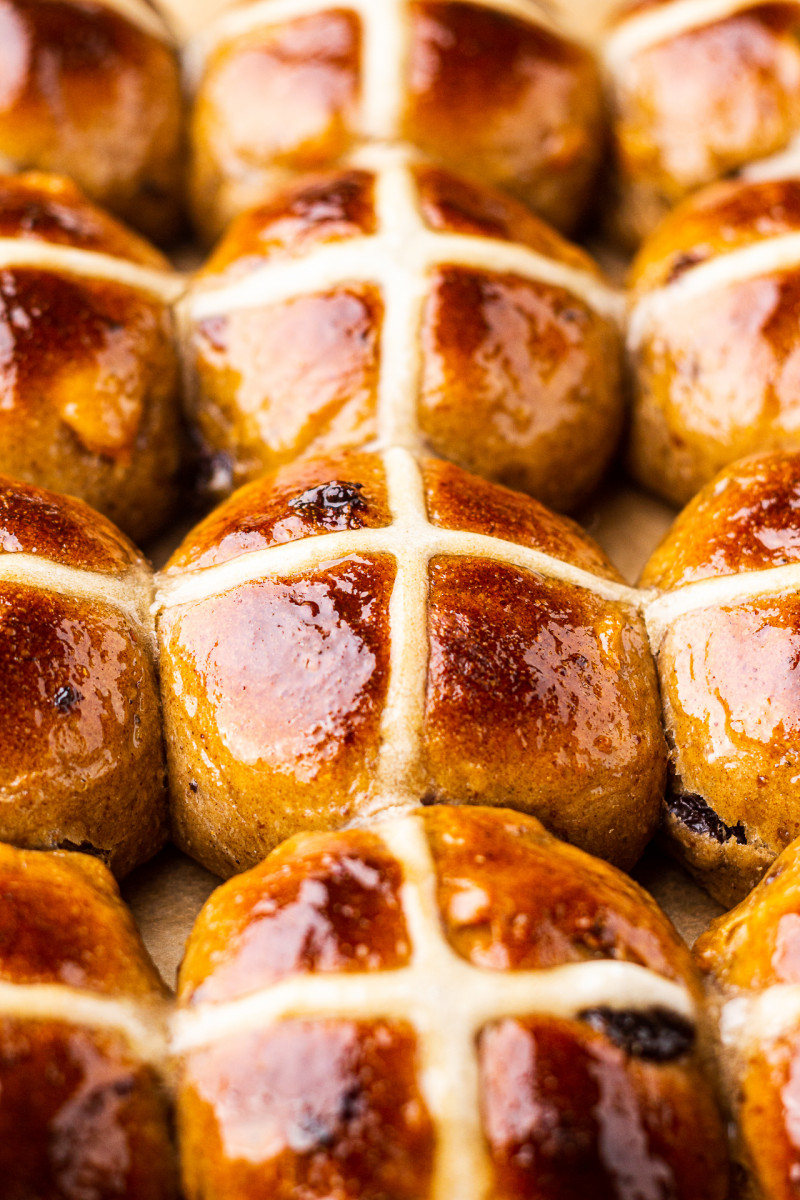

- 100 g / ¾ cup raisins (or sultanas)
- 1-2 oranges (2 for pronounced orange taste), zest and juice
- 500 g / 4 cups bread flour*
- ½ tsp salt
- 9 g / 3 tsp dried instant yeast
- 250 g / 8.8 oz dates
- 10 ml / 2 tsp vanilla
- approx. 3 tsp spices**: 1¼ tsp cinnamon, ½ tsp ginger, ½ tsp nutmeg, ½ tsp cardamom, ¼ tsp cloves
- 100 g / ½ cup finely chopped dried apricots
- 70 g / 1/3 cup mild olive oil or other neutral oil
‘CROSS’ FLOUR PASTE
- 62 g / ½ cup flour (bread or AP)
- water
- Pour orange juice into a small pot, bring it to a gentle simmer than switch the heat off. Stir in raisins, set aside to soften.
- In a bowl of a standing mixer, combine flour, salt, instant yeast, spices and orange zest. Mix them on the low speed, using a dough hook attachment. You can also do this by hand by the dough is very sticky so not easy to handle.
- Place pitted dates in a blender along with 300 ml / 1.25 cups of liquid (use orange juice you softened raisins in, 10 ml / 2 tsp vanilla and water if you don’t have enough orange juice) and olive oil. Blend until smooth – use a spatula to make sure the dates are blended really well.
- Add date puree to the dry ingredients and mix on low speed until combined.
- Knead on the lowest speed (KitchenAid 1 and 2) until the dough is elastic and smooth and a bit tacky. It should take about 10 minutes, rest the dough for a minute to relax the gluten if it’s not coming together. Use a spatula to ensure that the dough at the bottom of the bowl is kneaded too.
- Once the dough is elastic (it is meant to be sticky) and comes away from the sides of the bowl, stop the mixer and add squeezed out raisins and chopped apricots. Knead on low speed just to combine.
- Transfer the dough to a lightly greased mixing bowl, cover with a piece of cling film and let it raise in a warm place until it’s puffy and airy and when you gently poke with your finger it springs back slowly and not all the way (not fully – that means it’s underproofed). You can also put it into the fridge overnight for a slow rise. If it’s not rising, place it in a switched off oven with a tray of hot water at the bottom to help.
- Empty the dough out onto your work surface and push the air out with your fingertips. Use a dusting of flour if needed but not too much, damp hands will help with stickiness.
- Split the dough into twelve equal parts – best to use kitchen scales here. Shape each portion of the dough into a money bag shape and then rolling each (seam down) with your cupped head against a clean (not floured) countertop to create a tight ball.
- Lay shaped buns on a paper lined baking tray in a 3×4 grid. Space them out approximately 1.5 cm / 0.6″ apart so that they have space to expand during proofing. Cover with cling film and leave another 60 minutes for another proofing.
- Pre-heat the oven to 200° C / 390° F. Mix flour and a little water (about 60 ml / ¼ cup) in a small bowl until you have a flour paste that runs off your spoon but only just, you don’t want it too runny as the crosses won’t stay on the buns.
- Once the buns have proofed, put the flour paste in a piping bag and pipe crosses on top of of the buns in continuous lines.
- Bake for 15-17 minutes, until the buns are golden. If you don’t mind a tiny bit of added sugar, you can glaze them with maple syrup, golden syrup, apricot jam or stem ginger syrup (that’s what I used).
**Traditionally, allspice and cinnamon are used. You can also use mixed spice, which is a readymade spice mix consisting of cinnamon, allspice, nutmeg, cloves, ginger, coriander and mace. I also love to add cardamom so go for any mix of spices you enjoy. For this amount of flour, 2-3 tsp of spice is perfect.

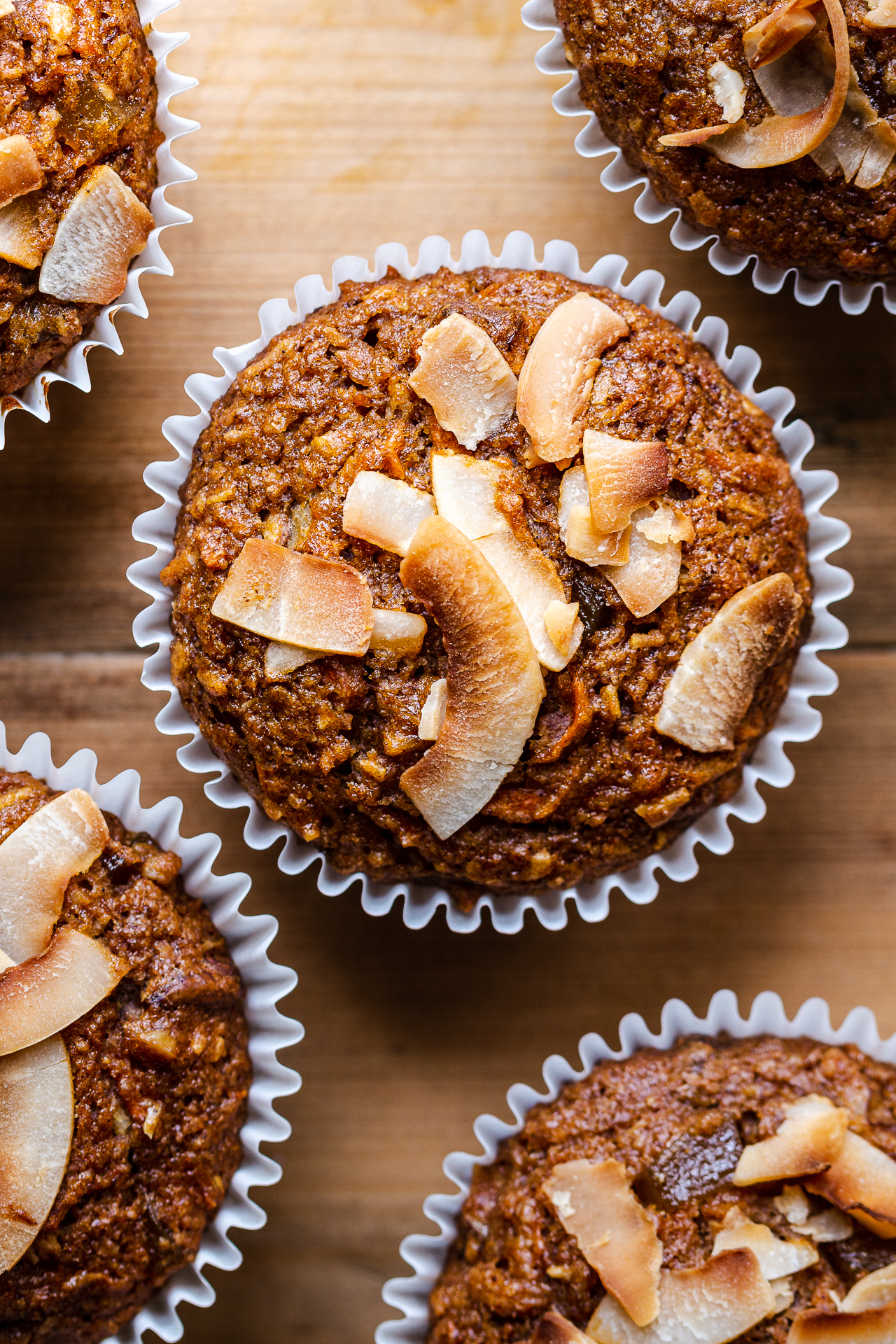
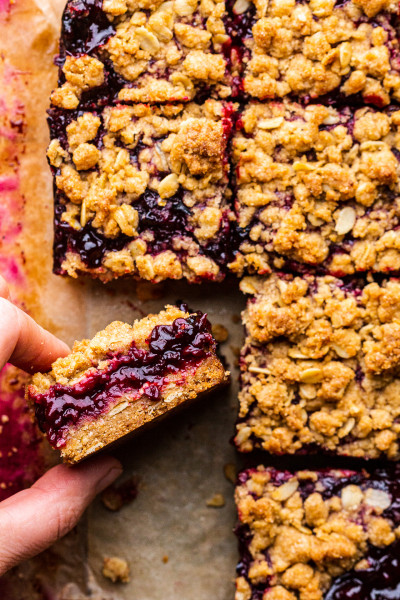
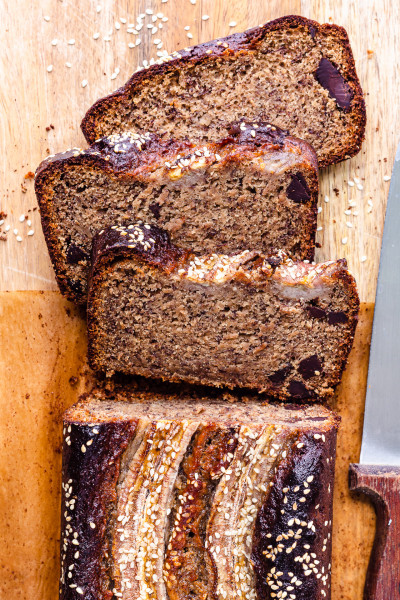
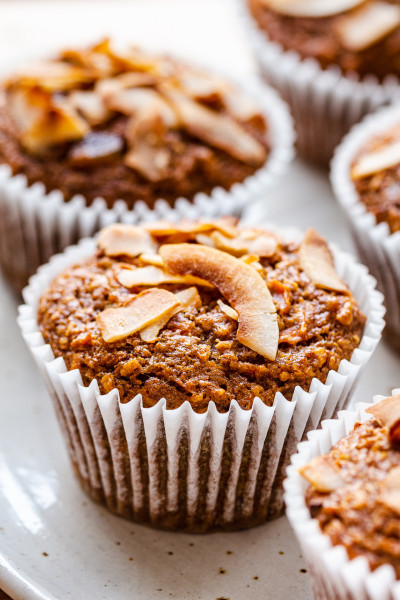
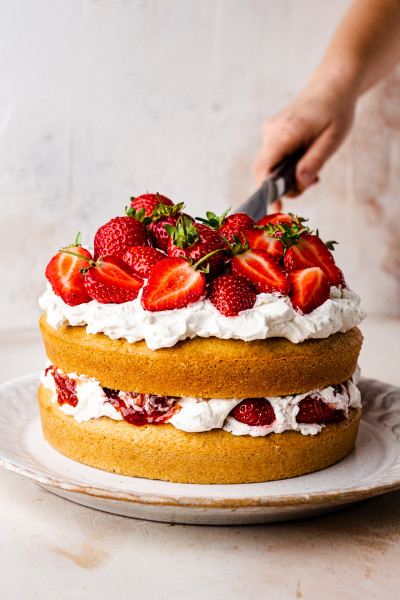
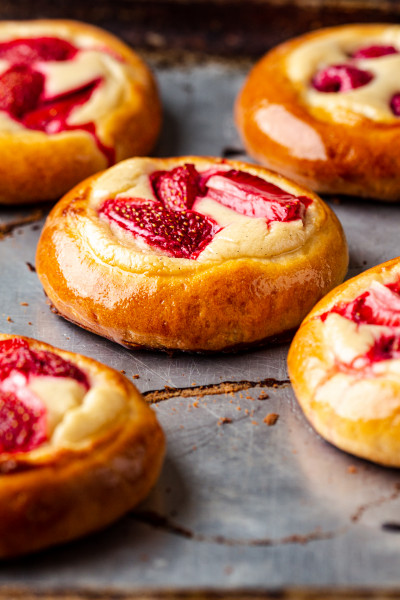
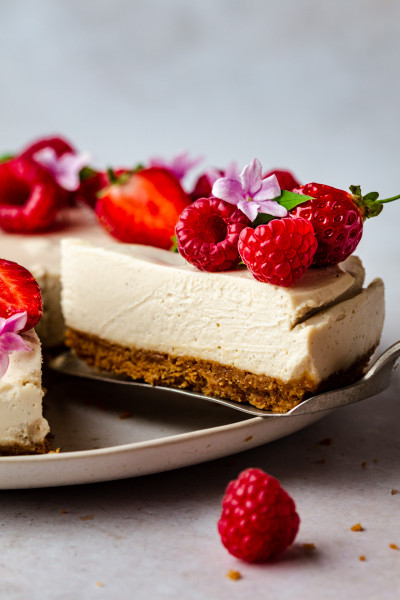
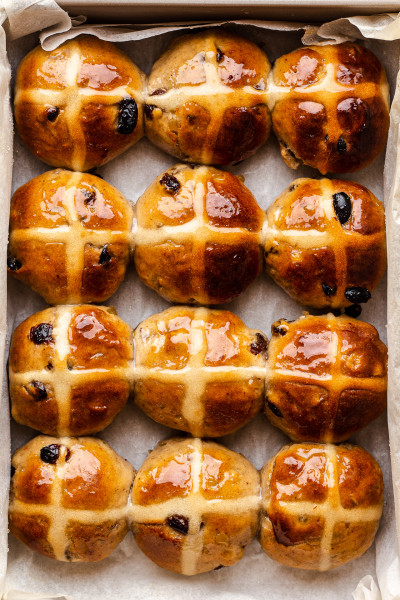
It's hard for me to say as I never used a bread machine but doesn't it simply mix the dough for you? If so I don't think there is any need for extra liquid. Start off with what the recipe says and add a little more if the dough feels dry. It should be soft and tacky. Hope this helps. Ania
I also think that I might like to add some almond flour into or instead of the bread flour for the 'crossing' paste, because I love almonds, of course!
Thoughts? And thank you for having so many innovative/creative recipes to share.
Sure you can use date syrup but since date syrup is pure sugar extracted out of dates you will not need anywhere near as much as if you were to use whole dates. My guess is that about 50g / 1.7 oz - 100 g / 3.5 oz will be plenty - depending what level of sweetness you are going for. This means that the date syrup will only be about 1/4 - 1/2 cup so you'll need to supplement the rest with water. You will need a little more liquid I think as dates themselves add moisture too but you will need to judge it once the dough is partially mixed up and add only if necessary. In terms of the cross made with almond flour, sure you can try although I worry that it may burn or fall apart - you will certainly need some regular flour there too, I think. Hope this helps. Ania